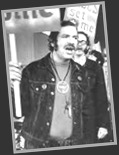The problem with messianic Judaism is its plausibility.
Look, for example, at the website of the Adat Yeshua Messianic Synagogue, Norwich, U.K. with its stylised menorah logo, rolling news bites from the Jerusalem Post, YouTube video clip of a Sabbath morning service and smiling welcome from ‘Rabbi Binyamin and Rebbetzin Sarah Sheldrake’.
But the synagogue’s Hebrew name translates as ‘Congregation of Jesus’ and it is one of three constituents of the Union of British Messianic Jewish Congregations, the others being in Leicester and Coulsdon, Greater London.
These organisations use Jewish liturgy and ape much of its tradition, claim to source kosher foods and even aspire to having their own Beth Din (Jewish ecclesiastical court). This makes them a trap for the unwary and a bolthole for the wretched and dispossessed.
Such a person was surely American Ceil Rosen (nee Rita Shirley  Elfbaum) who was raised by overly-strict adoptive parents as an Orthodox Jew and even married as one, only to become attracted to Christianity before persuading her husband to join her.
Elfbaum) who was raised by overly-strict adoptive parents as an Orthodox Jew and even married as one, only to become attracted to Christianity before persuading her husband to join her.
This is how the US-based Jews for Jesus movement was born and Called To Controversy* is not only a biography of its founder, Moishe (Martin) Rosen but a baleful attempt by the couple’s younger daughter to justify and legitimise the corruption, dilution and diminution of both Christianity and Judaism by the wilful melding of the two. 
Moishe Rosen is dead and not able to defend himself. So I will direct my anger at his widow and Ruth Rosen, who wrote the book and ask how purportedly intelligent, educated people can behave like this? There are many universally respected Jewish and Christian theologians who enjoy warm professional and personal friendships – and scholarly debates – without ever striving to persuade each other to apostasy.
But time again in her clumsily written diatribe, Ruth Rosen pre-empts criticism of her parents’ antics by claiming, one way or another, that the diverse Jewish community is united only in its disbelief of Christ as the Messiah.
No, Ruth! Even those of us who live simply as ‘cultural’ rather than ‘religious’ Jews are bound by our regularly repeated belief in the unity of God (‘Hear O Israel, The Lord Is Our God, The Lord Is One’). This does not allow for Him to be split in three. Not now; not ever.
Moreover, we are tied by the scarlet thread of ‘separation’ which runs through every tenet of traditional Judaism, making us a would-be Kingdom of Priests and so giving us the prophetic instinct to lead society in its best endeavours – ‘a light unto the nations’.
We are not bonded by the Christian Gospels, some of which even the Church now admits helped to inspire centuries of anti-Jewish hatred. Neither are we united by jingles or slogans – embodied in the very name ‘Jews For Jesus’. This thought brings me to an unintentionally funny scene in which Rosen found himself seated on a flight to Israel with a Chassid – a member of an ultra-Orthodox Jewish sect whose members advocate ‘missionising’ – but solely to fellow Jews.
The Chassid asked Rosen if he was a ‘real Jew’ and showed him his tephillin (‘phylacteries’ or prayer boxes whose contents include a passage from the Shema:
שְׁמַע, יִשְׂרָאֵל יְהוָה אֱלֹהֵינוּ, יְהוָה אֶחָד’
Hear, O Israel: the Lord our God, the Lord is one.’
Rosen had a set with him and put them on as evidence of his Jewishness.
Ruth writes: “The man’s eyes opened even wider than before as he watched. Then he said, ‘Anybody could learn that’.” Quite so!
 But like her late father – indeed like current US Republican presidential candidate Rick Santorum who two years ago was paid £3,700 (US $5,924) to speak at an event hosted by the Messianic Jewish Alliance of America – Ruth doesn’t want to learn.
But like her late father – indeed like current US Republican presidential candidate Rick Santorum who two years ago was paid £3,700 (US $5,924) to speak at an event hosted by the Messianic Jewish Alliance of America – Ruth doesn’t want to learn.
Mr Santorum has an excuse not to comprehend as he is a devout Catholic without pretentions to a Jewish background. Nonetheless let me remind him, Ruth and her mother of the remarks once made by Dr Sidney Lawrence, Director of the Jewish Community Relations Council in Kansas City to members of the Fellowship of Christian Testimonies to the Jews:
“So far as missionary work is concerned, I think of two Yiddish words. The first is narishkeit, which means ‘foolishness.’ That you should attempt to come to us Jews and tell us about our Messiah is narishkeit. That you should tell us that somebody died for our sins and rose again from the dead is narishkeit. But it’s not only narishkeit, it’s chutzpah. Chutzpah means ‘effrontery,’ and I must ask, who are you to tell us anything? Believe me, if there were anything in to it, the rabbis would have told us that Jesus was the Messiah. I’m sorry to disappoint you, but I have nothing further to say.”
Dr Lawrence’s remarks encapsulate the matter, even now: Messianic Judaism attempts to make a new religion by some weird artificial process. If it were ever going to happen, it would have occurred gradually in an organic process, not by a sloganised advertising campaign.
Years before, Rosen’s father had told him another truth: “This book (the New Testament) has come between me and you, and until you give it up, you can’t be my son.” But he didn’t and the result was an irreconcilable split which became most apparent when he visited his dying mother in hospital.
Here is a third: One of Rosen’s emotional mentors was the fabled American longshoreman philosopher, Eric Hoffer, who some say was of Jewish stock and one of whose best remembered essays is The Jews Are A Peculiar People. He wrote:
longshoreman philosopher, Eric Hoffer, who some say was of Jewish stock and one of whose best remembered essays is The Jews Are A Peculiar People. He wrote:
“Things permitted to other nations are forbidden to the Jews.
Other nations drive out thousands, even millions of people, and there is no refugee problem. Russia did it. Poland and Czechoslovakia did it.Turkey threw out a million Greeks and Algeria a million Frenchmen. Indonesia threw out heaven knows how many Chinese--and no one says a word about refugees.
“But in the case of Israel, the displaced Arabs have become eternal refugees. Everyone insists that Israel must take back every single Arab. Arnold Toynbee calls the displacement of the Arabs an atrocity greater than any committed by the Nazis. Other nations when victorious on the battlefield dictate peace terms. But when Israel is victorious it must sue for peace.
Everyone expects the Jews to be the only real Christians in this world.”
I’m sure I’m not the only one to think that Hoffer’s use of the word ‘peculiar’ is on the psalmic model “For the Lord hath chosen Jacob unto himself, and Israel for his peculiar treasure" (Psalm 135:4). Why would Hoffer - Rosen’s hero - want Israel and its citizens to become indistinguishable from other citizens of the world by becoming diluted ‘Jewish Christians’ or ‘Christianised Jews’? Surely not!
My final thought is thus: Jewish people sometimes marry non-Jews and their Jewish identity appears to fade to almost nothing until it resurfaces some generations later when a descendant discovers their roots.
So it could be with the descendants of Moishe and Ceil Rosen who may view their forebears’ lives as a quaint and pointless aberration. Meanwhile, Moishe Rosen’s odd-ball existence ended with his being buried in his tallit – the traditional Jewish prayer shawl. His headstone bears an image of a Star of David centred by a Cross.
But please don’t simply take my view. Here is the spontaneous and quite independent opinion of my husband, who read the book in tandem with me:
“After reading the biography of “Jews for Jesus” founder Moishe Rosen by his daughter, Ruth Rosen, I am left feeling sad and angry by turns. Sad because he and his family have rejected their ancient faith in the God of Abraham, Isaac and Jacob, although they would undoubtedly deny this. (How they would explain away the central tenet of Jewish belief ‘Hear O Israel the Lord our God, the Lord is ONE’ i.e. indivisible, I don’t know.) Angry because their embrace of a religion antithetical to Judaism is insufficient for them as they relentlessly attempt to suborn former co-religionists to their beliefs.
“Let me say that I am not anti-Christian by any means, it is a worthy faith for gentiles but for Jews it is, or ought to be, an absolute no-no. I’ve a feeling that the phrase ‘mutually exclusive’ is an Achilles heel for these self-described Messianic Jews as several times it is mentioned and dismissed. Perhaps the author is getting in her retaliation first? However the awkward truth is that Judaism and Christianity ARE mutually exclusive; stripping ‘Jews for Jesus’s beliefs of accoutrements, either Jesus was the messiah or he wasn’t. If he was, then Judaism has no validity, if he wasn’t then ditto for Christianity and to attempt to synthesise two differing and opposing religions is bound to fail. Both are necessarily diminished.
“Of course, religion is a matter of belief and not of scientific proof. Most of the arguments put forward for the Rosens’s conversion to their conviction that Jesus is the Messiah could be shot down from a Jewish perspective by any competent rabbinical student tout de suite. More’s the pity then that the rabbi to whom Rosen turned for reasons for Jews not to embrace the daughter faith was inadequate and failed miserably in the task. How different it all might have turned out had that rabbi been more knowledgeable!
“For example, the Messiah (Hebrew: Mashiach) means ‘anointed one’ - without any supernatural connotations – a figure who will bring universal peace, gather in all the exiles of Israel and rebuild the Temple. Clearly Jesus didn’t manage this and there are no references to a second coming of this person in the Hebrew Bible for him to have a second chance. The Messiah will also be a descendent of King David through the paternal line and therefore claims that Jesus had no human father are rather hard to reconcile with this condition. If the undisputed messiah were to appear tomorrow no Jew would worship him as that must be reserved for God alone.
“Other claims that Jesus is foretold as the messiah are just as easy to refute; for example the ‘virgin birth’. The Hebrew word for ‘virgin’ is always ‘betulah’ but the word used in Isaiah 7:14 is ‘alma’ means a young woman, not necessarily one who has not had sexual relations. Additionally the quote most often used to justify the claim that Jesus was the messiah comes from Isaiah, chapter 53, the ‘suffering servant’. This refers to the People Israel (in the Hebrew masculine singular grammatical form) and follows on from this theme previously articulated in chapter 52.
“Unlike other religions, Judaism doesn’t just rely on the word of one founder prophet who claims divine revelation unheard by any other person, rather the Torah was given to the whole Jewish People publicly and collectively “those who are here and those who are not here” at Mount Sinai.
“People of different faiths can be great friends and have a deep respect for the other’s beliefs. However problems arise when one of the parties insists that the other’s religion is erroneous, or at least ‘incomplete’, and begins exerting pressure to force his beliefs upon that person. This is arrogance (despite Moishe Rosen’s assertion that “no Christian wants to be arrogant”) even if well-intentioned and raises barriers –and hackles- between former friends. Missionary groups to Jews whether they be of the Jewish or gentile variety fall into this category. Jewish communities therefore close ranks in the interest of self-preservation against the soul-snatchers just as much as they would against those who wish to harm Jews physically.
“From the emergence of Christianity two millennia ago and later with the rise of Islam, Jews have been coerced to convert to the new religions and when that failed, were scourged, tortured, whipped and finally murdered in the attempt to force compliance but still most would not deny their faith, preferring a martyr’s death to apostasy. That any Jew would voluntarily become an apostate and, infinitely worse, seduce other Jews to do the same, is what produces the aforementioned sadness and anger in me.”
BRIAN FINK
* Called to Controversy is published by Thomas Nelson @ US $22.99 (approx. £14.35).
msniw


2 comments:
Whether or not you feel you can post my comment you owe it to yourself, your readers and me to mention that you took that quote from Mr. Lawrence directly from my book. It is possible to disagree in an honest respectful way. It is interesting that you describe my book as a diatribe. I feel your heart to protect those you love from what you believe to be false. and whether or not you could ever say it, you know my heart is to share what I believe to be true. Thanks for reading and reviewing the book. Happy Pesach. Ruth Rosen
Yes, I found the quotation from Dr Lawrence in Ruth Rosen's book. Where else? Further, my instinctive, visceral reaction was not to protect any individual but Judaism itself - and I write as a deeply 'Jewish' if not fully-observant Jew living in the Jewish State of Israel. Natalie Wood.
Post a Comment